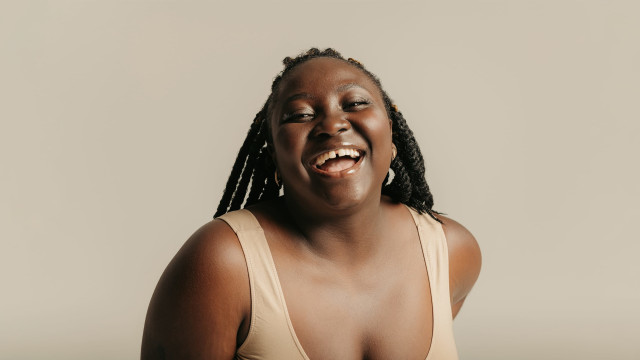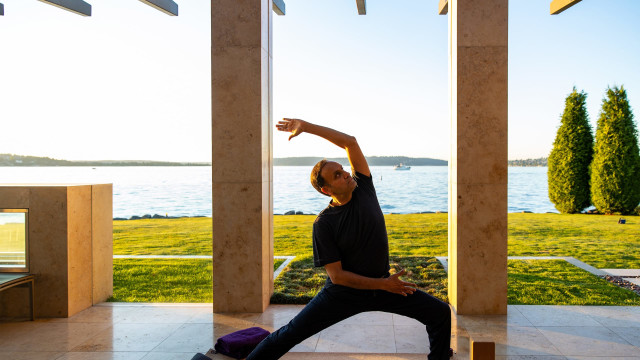Try This Practice for Self-Love

Meditating on loving-kindness means sending warm, loving energy to every cell in your body and then radiating it out into the world. It’s good for your body, mind, and spirit: Science shows that being kinder to ourselves lowers stress and anxiety while building resilience and self-esteem — precursors to happiness. Meditating on loving kindness has even been linked to improved cognitive function. And it’s simple to do!
Loving-Kindness Meditation: Explained
Loving-kindness meditation (LKM) — also called metta meditation, or maitrī meditation in Sanskrit — is said to have originated in ancient India and is popular in Buddhism. The practice involves silently repeating sentiments such as "may you be happy" and "may you be free from suffering," directed both inward and out. “This meditation can become a bridge of empathy and union with others,” says Roundglass Research Lead David Vago, Ph.D. Translation? It makes us feel warm and connected, and reminds us that we’re not alone.
Research shows that practicing LKM for as little as 7 weeks reduces stress, improves cognitive function, and increases positive emotions. One study found that daily practice was linked to a significant decrease in inflammation, demonstrating that LKM affects not only the brain, but the body’s physiology as well.
Positive psychology researcher Barbara Fredrickson wanted to know more about how LKM affects emotions, and how the practice may help build cognitive, emotional, and physical resources, such as happiness and immunity. Over the course of 7 weeks, participants in the LKM group practiced for 15 to 22 minutes a day. Fredrickson and her team observed that LKM led to shifts in people’s daily experiences of positive emotions, “including love, joy, gratitude, contentment, hope, pride, interest, amusement, and awe,” she writes. These shifts were linked to increases “in a variety of personal resources,” including mindful attention, positive relationships with others, good physical health, self-acceptance. “They enabled people to become more satisfied with their lives and to experience fewer symptoms of depression,” says Fredrickson. Because, cultivating kind, loving feelings for all sentient beings makes it easier to be kind and loving toward yourself, says Roundglass Senior Scientist Rebecca Acabchuk, Ph.D.
Understanding a Self-Love Mindset
Self-love and self-acceptance (known scientifically as the self-positivity bias) are indeed linked to overall life satisfaction. In fact, research shows that self-love leads to better mental health, more motivation, better sleep, less stress and anxiety, and stronger determination.
“To me, self-love means honoring and embracing your whole self: owning your strengths and accepting your flaws,” says Acabchuck. It also applies to how we treat ourselves, says Roundglass yoga teacher and “Feel Good” therapist Sunaina Rekhi
“Self love is about taking care of yourself physically, mentally, spiritually, and emotionally,” she says. “How do we talk to ourselves? How do we love ourselves in every single moment?”
One way is to start practicing loving-kindness meditation for self-love.
Try this: Yoga for Self-Love with Sunaina Reiki. Show yourself some loving kindness by practicing this short asana sequence.
Starting the Practice
“We’re learning to really open the heart to all beings, even those we don’t know very well,” says Roundglass meditation teacher Lisa Kring. Changing the way we naturally feel about ourselves and others takes practice and consistency, adds Reiki.
Try this beginner’s loving kindness practice that you can repeat each day:
- Sit comfortably and set an intention for your own happiness and that of all beings. Repeat quietly or aloud:
May I be happy.
May I be free from pain.
May I live with ease.
May I be healthy and whole.
- After contemplating and accepting any feelings that arise, call to mind someone you know and love — unconditionally. Repeat the same phrases for them:
May you be free from pain.
May you live with ease.
May you be healthy and whole.
- Now envision someone you feel neutral toward. Let love and good will build up inside you for this person as you repeat the phrases again:
May you be free from pain.
May you live with ease.
May you be healthy and whole.
- Now think about someone you may be struggling with. Maybe you feel built-up resentment toward them for past hurts. Remember that just like you, this person wants and deserves love. Focus on your intention for love and good will. Allow your heart to open as you repeat the phrases:
May you be free from pain.
May you live with ease.
May you be healthy and whole.
- Lastly, send love and well-wishes to every living creature. Feel your heart radiating and focus on universal interconnection as you repeat the phrases for the entire universe:
May you be free from pain.
May you live with ease.
May you be healthy and whole.
Try this: Loving Kindness for All Beings: Discover how the practice of kindness can be a path to transformation.
Remember to make the practice your own. Play around with different guided meditations for self-love on the Roundglass app, and figure out which ones speak the loudest to you.
Key Takeaways:
- Science shows that being kinder to ourselves lowers stress and anxiety while building resilience and self-esteem.
- Practicing loving kindness meditation for as little as 7 weeks reduces stress, improves cognitive function, and increases positive emotions.
- Research shows that self-love leads to better mental health, more motivation, better sleep, less stress and anxiety, and stronger determination.









